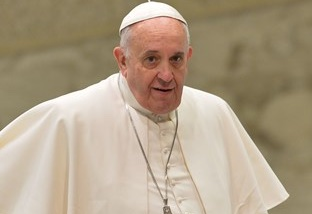Pope Francis: reduce military spending, increase humanitarian aid

Image: Vatican Media
Source: Vatican News
On World Humanitarian Day, Pope Francis repeated his call for reducing military spending to provide for growing humanitarian needs, thus converting " the tools of death into tools of life" for the most vulnerable in war and disaster-stricken areas.
Writing on his Twitter account on Saturday, Pope Francis said: "It is our responsibility to help eradicate hatred and violence from hearts. We encourage you to lay down your arms, to reduce military spending to provide for humanitarian needs, to convert the tools of death into tools of life."
UN Secretary-General Antonio Guterres issued a similar message on the Day, in which he decried the lack of funding of humanitarian aid, the demand of which has increased ten times in two decades. "As crises multiply, it is unacceptable that humanitarians are being forced to reduce aid to millions of people in need," Guterres said.
"This year, global humanitarian operations aim to get life-saving aid to 250 million people in 69 countries Sadly, funding is far off track"
The UN Secretary-General further noted that other challenges have also multiplied over the past 20 years, including "rising geopolitical tensions, a blatant disregard for international humanitarian and human rights law and deliberate assault and disinformation campaigns". Aid workers today also face much greater risks of been killed, injured or abducted. "Humanitarianism itself is now under attack", Guterres said.
World Humanitarian Aid Day (WHD) was established by the United Nations General Assembly in 2008 to honour the work of humanitarian workers and raise awareness of the need for assistance in crises around the world.
The campaign's theme, #NoMatterWhat, underscores the unwavering commitment of humanitarians to deliver life-saving assistance to people in need, regardless of locations, challenges and dangers.
This year's campaign commemorated the 20th anniversary of the bombing attack on the UN headquarters in Baghdad, Iraq, in 2003, which killed 22 humanitarian aid workers, including the UN Special Representative of the Secretary-General for Iraq, Sergio Vieira de Mello.
That tragedy, recalled Guterres in his message, marked a turning point, "because today, although humanitarians are respected around the world, they may also be targeted by those who would do them harm."
Saluting the "courage and dedication" of humanitarian workers, the UN Secretary-General reaffirmed the UN's full support for their work around the world. He wrote: "Humanitarians are finding new ways to venture deeper into disaster-stricken regions, and closer to the front lines of conflict, driven by a single purpose: to save and protect lives."


















